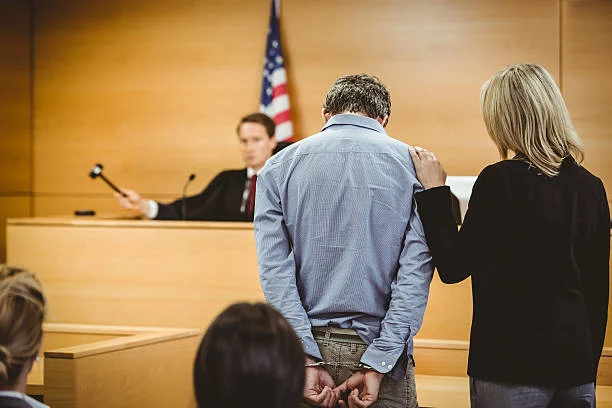You get the call. Your friend got arrested. Now you’re being questioned too. Before you know it, you’re both facing the same charges for the same incident. What is the co defendant meaning according to the law for Criminal Cases?
Being charged alongside someone else creates complications that solo defendants don’t deal with.
Here’s what you need to know about co-defendant cases and how they work in California.
What a Co-Defendant Is
A co-defendant is someone charged with a crime alongside one or more other people in the same criminal case. The charges usually stem from the same incident or series of related events.
Think of it this way: If two people allegedly commit a crime together, prosecutors can charge them both. Each person becomes a co-defendant in that case.
Common situations with co-defendants:
- Two people allegedly rob a store together
- Multiple individuals accused of drug distribution
- Several people charged in a conspiracy case
- Co-workers accused of fraud or embezzlement schemes
The charges don’t have to be identical. One defendant might face robbery charges while the other faces charges for being an accessory or conspiracy. What matters is that the alleged crimes arose from the same circumstances Criminal Cases.
How California Handles Co-Defendant Cases
California has clear rules about when multiple defendants should be tried together. California Penal Code Section 1098 states that when two or more defendants are jointly charged with any public offense, they must be tried jointly unless the court orders separate trials.
a. Joint Trial
This means the default in California is a joint trial. Prosecutors can charge multiple people together, and the court will generally keep them in the same trial unless there’s a good reason to split them up.
Why Courts Prefer Joint Trials
Efficiency drives this preference. Joint trials save time and resources for everyone involved.
Benefits of trying co-defendants together:
- Witnesses testify once instead of multiple times
- The same evidence gets presented to one jury
- Court resources aren’t duplicated across separate trials
- Risk of inconsistent verdicts decreases
But efficiency isn’t the only consideration. Fair trial rights matter more Criminal Cases.
b. When Separate Trials Make Sense
Just because California law favors joint trials doesn’t mean co-defendants always go to trial together. Courts can and do order separate trials when keeping defendants together would violate someone’s right to a fair trial Criminal Cases.
Reasons a judge might grant separate trials:
- One defendant confessed and the confession implicates the other defendant
- The defendants plan to present conflicting defenses
- Evidence admissible against one defendant would unfairly prejudice the other
- One defendant’s criminal history could bias the jury against the other
- The case against one defendant is significantly weaker than the case against the other
Defense attorneys file what’s called a motion to sever when they want separate trials. The judge has discretion to grant or deny this request based on the specific circumstances.
The Problem With Shared Legal Representation
Can one attorney represent multiple co-defendants? Technically yes. Practically? It’s rarely a good idea.
While California doesn’t outright ban joint representation, courts and legal ethics rules strongly discourage it. The risk of conflicts of interest is just too high Criminal Cases.
Why One Attorney Can’t Serve Two Masters
Criminal defendants deserve their attorney’s complete loyalty. When one attorney tries to defend multiple co-defendants, that loyalty gets divided.
Conflicts that arise with joint representation:
- One defendant might benefit from a plea deal that requires testifying against the other
- Defendants may want to blame each other for the crime
- One defendant’s defense strategy might directly harm the other’s case
- The attorney can’t cross-examine one client to help protect the other
- Confidential information from one client might be useful for the other’s defense
California courts have consistently recognized these problems. Judges will question any arrangement where one attorney represents multiple defendants.
In many cases, courts will require separate counsel to protect each defendant’s constitutional rights.
When Co-Defendants Turn on Each Other
One of the biggest risks in co-defendant cases is when defendants start pointing fingers at each other. Prosecutors know this. They often use it to their advantage Criminal Cases.
The Plea Deal Dilemma
Prosecutors offer one defendant a better deal. The catch? They have to cooperate. That usually means testifying against the co-defendant.
Why this creates immediate problems:
- An attorney can’t advise one client to take a deal that destroys the other client’s defense
- The conflict becomes direct and unavoidable
- Joint representation becomes impossible
Even with separate attorneys, cooperation affects everyone:
- One defendant’s decision to testify changes everything for the other
- Co-defendant testimony hits hard because that person was allegedly at the scene
- The jury often views testimony from someone involved as more credible
- Your co-defendant knows details that only someone present would know
Conflicting Defense Strategies
Sometimes, co-defendants simply can’t both be telling the truth.
When defenses conflict like this, severance becomes critical. Each defendant needs the freedom to present their own defense without worrying about how it affects their co-defendant.
Your Rights as a Co-Defendant
Being charged alongside someone else doesn’t mean your rights disappear. You’re still entitled to all the constitutional protections any criminal defendant receives.
Key rights in co-defendant cases:
- Right to independent legal counsel
- Right to a fair trial free from prejudice
- Right to confront witnesses against you
- Right to present your own defense
- Right to request separate trials if joint proceedings would be unfair
You also have the right to object if the court tries to appoint the same attorney for you and your co-defendant. Once you object, the court must investigate whether a conflict of interest exists.
Strategic Considerations in Co-Defendant Cases
Your position as a co-defendant creates unique strategic questions.
Should You Accept a Joint Trial?
This depends entirely on your specific situation. Sometimes a joint trial works in your favor. Other times it’s a disaster waiting to happen.
Joint trials might help you if:
- The evidence against your co-defendant is weaker, making the prosecution’s overall case look shakier
- Your co-defendant’s defense supports your defense
- Separating trials would just mean going through the same process twice, with likely similar outcomes
Separate trials might help you if:
- Your co-defendant has a worse criminal record which could bias the jury
- The evidence against your co-defendant is much stronger than the evidence against you
- Your defenses conflict with each other
- Your co-defendant might testify against you
A good criminal defense attorney will analyze these factors and advise whether to seek severance.
The Importance of Independent Counsel
Never assume you and your co-defendant have the same interests just because you’re charged together. Even if you’re friends or family members, your legal situations might be completely different.
Securing independent legal counsel protects you from conflicts down the road. Your attorney should represent only you, not multiple defendants in the same case.
What Happens in the Courtroom
When co-defendants do go to trial together, the courtroom dynamics get complicated.
How complications take place:
- The jury hears evidence against multiple people.
- They must evaluate each defendant separately and reach individual verdicts.
- This isn’t always easy for jurors to do.
- Judges give instructions telling jurors to consider each defendant individually.
- They’re told to evaluate the evidence against each person separately.
But keeping everything straight in their minds becomes challenging when multiple defendants are involved.
This is another reason defense attorneys often push for separate trials. The risk that a jury will lump all defendants together is real.
What Being a Co-Defendant Means for Your Case
Finding yourself charged as a co-defendant creates layers of complexity most criminal defendants don’t face. Your case isn’t just about what you allegedly did. It’s also about your relationship to the other defendant, their actions, their statements, and their legal strategy.
Do you cooperate with prosecutors?
Do you seek a separate trial?
Do you testify?
These choices carry extra weight in co-defendant cases.
Each defendant needs the freedom to present their own defense without worrying about how it affects their co-defendant. Reach out to The Nieves Law Firm for legal guidance today.






